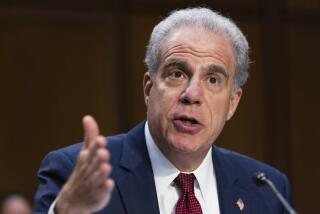Deeper Cuts Had Been Sought in Tobacco Case
Senior Justice Department officials, under fire for a 90% reduction in sanctions sought in the governmentâs racketeering case against the tobacco industry, had pushed for even deeper cuts, people close to the situation say.
Government lawyers, who were ordered to slash their demand for a $130-billion industry-funded smoking cessation program, had been planning to propose a $16-billion campaign as closing arguments in the marathon case got underway last week, according to people close to the trial team, who spoke on condition of anonymity.
But on the morning of June 7, the day of the governmentâs summation, the trial team was told to cut the demand still further, to $6 billion, the sources said. After a heated lunch-hour meeting -- at which lawyers told senior staff that they couldnât credibly propose $6 billion -- they were cleared to ask federal Judge Gladys Kessler for a $10-billion program, the sources said.
The $10-billion proposal, made public that afternoon, sparked outrage among anti-smoking activists and Democratic lawmakers, who claimed that political appointees in the Justice Department improperly interfered to protect tobacco companies from a big hit. At the request of several lawmakers, the departmentâs Office of Professional Responsibility has opened an investigation into the sudden reduction in the governmentâs demand.
Senior officials, led by Associate Atty. Gen. Robert McCallum, the departmentâs No. 3 leader, have said the change was entirely proper. They say it reflects the legal realities facing the government after a federal appeals court limited remedies they could seek under civil provisions of the Racketeer Influenced and Corrupt Organizations Act, or RICO.
To government lawyers, however, it appeared that the real âobject of the game was to get the number down ... as low as possibleâ and find a legal rationale later, a person close to the trial team said.
According to Matt Myers, president of the Campaign for Tobacco-Free Kids, âthe fact that the number moved continuously over the last 24 hours ... is further proof that the ultimate figure was a political calculation, not a legal one.â
The Los Angeles Times and Washington Post reported last week that government lawyers had been ordered to slash the most expensive remedy they were seeking in the 8 1/2 -month trial.
The New York Times on Wednesday disclosed a May 30 memo in which the trial teamâs two top leaders had urged McCallum not to lower the governmentâs demand. âWe do not want politics to be perceived to be the underlying motivation, and that is certainly a risk if we make adjustments in our remedies presentation that are not based on evidence,â said the memo by Sharon Eubanks, director of the trial team, and Stephen Brody, the deputy director.
Justice Department officials declined Thursday to make McCallum, Eubanks or Brody available for interviews. Department spokesman Charles S. Miller also declined to comment on the 11th-hour changes in the scale of the request.
The $130-billion proposal had been based on testimony by Dr. Michael C. Fiore, an expert witness, that it would cost $5.2 billion a year over 25 years to help all addicted smokers who wanted to quit.
In defending the revised request for $2 billion a year for five years, Justice officials said it met the appeals courtâs February mandate that RICO sanctions be narrowly tailored to prevent future fraud, not to cure past harm. The smaller program, they said, would serve a quantity of smokers roughly equal to the number likely to be addicted as a result of future industry misconduct.
Yet on May 12, three months after the appeals court ruling, the Justice Department had defended the $130 billion as consistent with the appeals decision.
In court papers filed that day and signed by Peter D. Keisler, head of the civil division, it had contended that the Fiore proposal âis not only forward-looking and aimed at future violations, but will act directly to prevent and restrain ongoing wrongful conduct of decades-long duration.â
More to Read
Sign up for Essential California
The most important California stories and recommendations in your inbox every morning.
You may occasionally receive promotional content from the Los Angeles Times.










